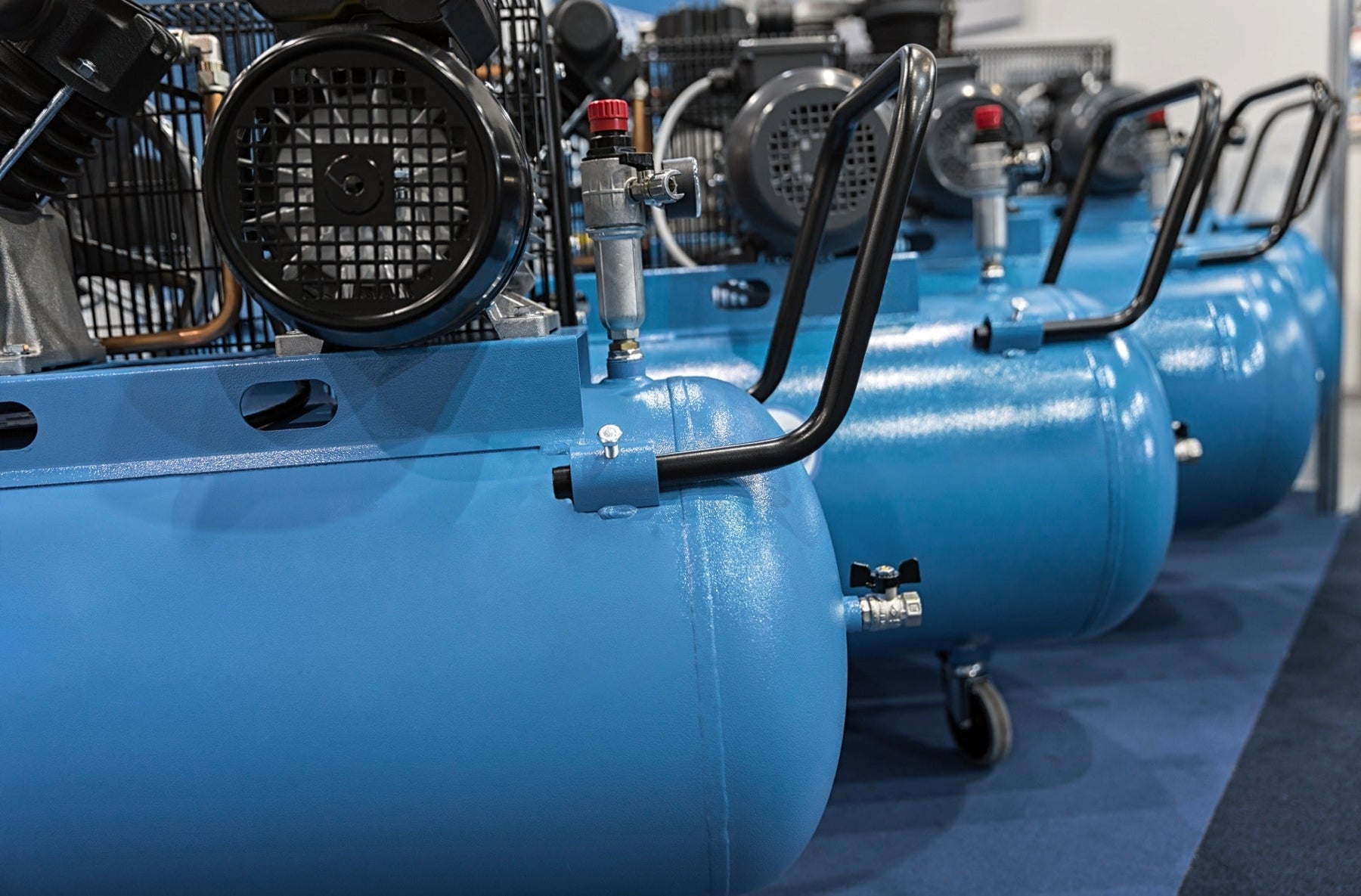
Air Compressor Performance Troubleshooting
Air compressors are workhorses in any shop or industrial setting. They power tools, equipment, and systems that keep operations moving without delays. But when performance starts to slip, it doesn't take long to notice. Maybe the tools aren't getting enough pressure. Maybe there's a strange sound that wasn't there before. Whatever the sign, a sluggish or unreliable compressor throws a wrench into the whole process.
Knowing how to spot trouble early and what to do about it can save time, money, and a lot of headaches down the line. This article is here to help identify common signs of compressor problems and guide you through some simple steps to get things back on track before the issue gets worse.
Common Performance Issues In Industrial Air Compressors
When a compressor starts acting up, it doesn't always shut down right away. More often than not, the signs start small. Ignoring them can turn minor performance issues into bigger mechanical failures.
Here are some of the most common issues industrial users experience:
- Loss of pressure during operation
- Unusual or loud noises while running
- Overheating without clear cause
- Repeated tripping of breakers or safety alarms
- Oil or moisture leaks around fittings
- Slow starts or failure to start
Loss of pressure is one of the most obvious signs something isn’t right. This could be from a worn-out pressure valve, a deteriorating hose, or a leak somewhere in the system. If it’s not constant, it can still make tool use frustrating and even dangerous.
Strange noises like clanking or hissing might signal loose belts, failing bearings, or air escaping from places it shouldn’t be. It’s tempting to ignore those sounds when the machine is still technically running, but catching them early usually prevents a full breakdown later.
Overheating is also a red flag. If a unit runs hotter than usual, it might be short on oil, have poor ventilation, or be pushing past its intended workload. A hot compressor can't perform the way it's supposed to and will wear down faster.
Each symptom tells a part of the story. The key is learning what your specific machine normally sounds and feels like, so anything outside that baseline stands out. For example, a facility manager once thought their compressor was just getting old. Turns out, it had a clogged filter that hadn't been swapped in months, and once replaced, the air output returned to normal.
If these problems aren’t caught and addressed early, you may face longer downtimes or even need to replace the entire unit. That’s why recognizing the warning signs and knowing what to check next is so helpful.
Troubleshooting Steps For Air Compressor Problems
Once you’ve noticed something off, it helps to walk through a few basic checks before assuming the worst. Proper troubleshooting isn’t just for mechanics. Basic know-how can make a huge difference for maintenance teams on the ground.
Start with these steps:
1. Check Power and Connections
- Confirm that the compressor is properly connected and receiving stable power.
- Look for tripped breakers or loose wiring that could interfere with operation.
2. Inspect and Replace Air Filters
- A dirty air filter blocks airflow and makes the unit work harder.
- Swap it out if it's clogged or hasn’t been changed in a while.
3. Examine Hoses and Fittings
- Listen for hissing sounds that could indicate a minor air leak.
- Tighten any loose connections and replace cracked hoses.
4. Test Pressure Settings
- Make sure the pressure switch and cut-in/cut-out settings are accurate.
- Reset if they’ve moved out of spec, especially following upgrades.
5. Monitor Fluid Levels
- Check oil or coolant levels and top off if they’re low.
- Low oil can lead to overheating and faster wear on moving parts.
6. Look at Belts and Pulleys
- Loose or worn belts affect motor and pump performance.
- Make sure they’re tight and not fraying or cracking.
When going through these checks, work methodically. Write down what you find. Compare observations to past performance logs if you have them. Documentation can save time if a technician needs to come out or if the issue reappears later.
If these checks don’t uncover the cause or the issue keeps returning, it may be time to reach out for professional help. That's where experienced industrial air compressor suppliers come in. They can help source the right replacement parts or even provide insight if something bigger is going wrong.
When to Call Industrial Air Compressor Suppliers for Help
Sometimes, after doing all the checks, the problem persists. That's the cue to consult with professionals who specialize in industrial air compressors. Knowing when to call in the experts can make all the difference in preventing a minor issue from becoming a major headache.
So, how do you know it's time to reach out?
- Persistent Issues: If you've addressed all the obvious issues, like cleaning filters and tightening connections, but problems are still popping up, it's time for a professional assessment.
- Unknown Noises: Unusual sounds that you can’t identify might be signs of bigger problems that need expert attention.
- Frequent Shutdowns: If the compressor keeps shutting down, it might have deeper mechanical faults or electrical problems that need to be diagnosed by a technician.
- Increased Downtime: When malfunctions are causing work stoppages and delays, it's time to bring someone in before production is further impacted.
Industrial air compressor suppliers don’t just sell parts. They bring in-depth knowledge and troubleshooting experience that can help keep your system functioning effectively. Choosing the right supplier can avoid unnecessary costs and repairs and keep your operations on track.
Preventive Maintenance Tips to Avoid Future Issues
Getting into a routine of regular maintenance can keep compressors working longer with fewer interruptions. A little effort now saves a lot of time and money later on.
Here are some preventive measures:
1. Follow a Maintenance Schedule
- Build a checklist of tasks like changing air filters, checking belt tension, and testing pressure levels.
- Schedule inspections based on operating hours or calendar dates and stick to it.
2. Stay Organized with Documentation
- Track maintenance activities such as replacements, inspections, and repairs.
- Keeping detailed notes gives helpful clues when performance issues pop up again.
3. Train Your Team
- Equipment should only be used by those who understand it.
- Make sure employees know the do's and don’ts and how to report strange behavior early.
4. Use High-Quality Parts
- Stick with OEM-equivalent filters, valves, and fittings when replacing components.
- These parts are made to meet the performance standards your compressor was built for.
5. Inspect Regularly for Leaks
- Even small air leaks add up over time.
- Make periodic checks part of normal maintenance routines.
A compressor that gets regular care is less likely to fail on the job. Maintenance is more than just changing parts. It’s about creating a system that runs smoothly for years to come without unpredictable issues.
Keeping Your Compressor Running Smoothly
Recognizing problems early, following a solid maintenance schedule, and using the right parts all go a long way in keeping your air compressor working properly. No machine lasts forever, but you can significantly extend its lifespan and performance by staying ahead of potential trouble.
Make air compressor upkeep a regular part of your operations. If things still go wrong or you’re faced with a larger issue, work with trusted industrial air compressor suppliers who understand your equipment and can support your needs. Taking these steps now helps avoid downtime, protects your investment, and keeps your processes running without surprises.
To ensure your air compressor operates smoothly and efficiently, working with knowledgeable industrial air compressor suppliers can make a real difference. At Compressor Filter Hub, we offer reliable solutions to keep your systems in top condition. Explore our range of products, including our selection of coalescers, to find the right parts that enhance performance and reduce downtime. Trust us to help maintain the quality and reliability your operations depend on.
